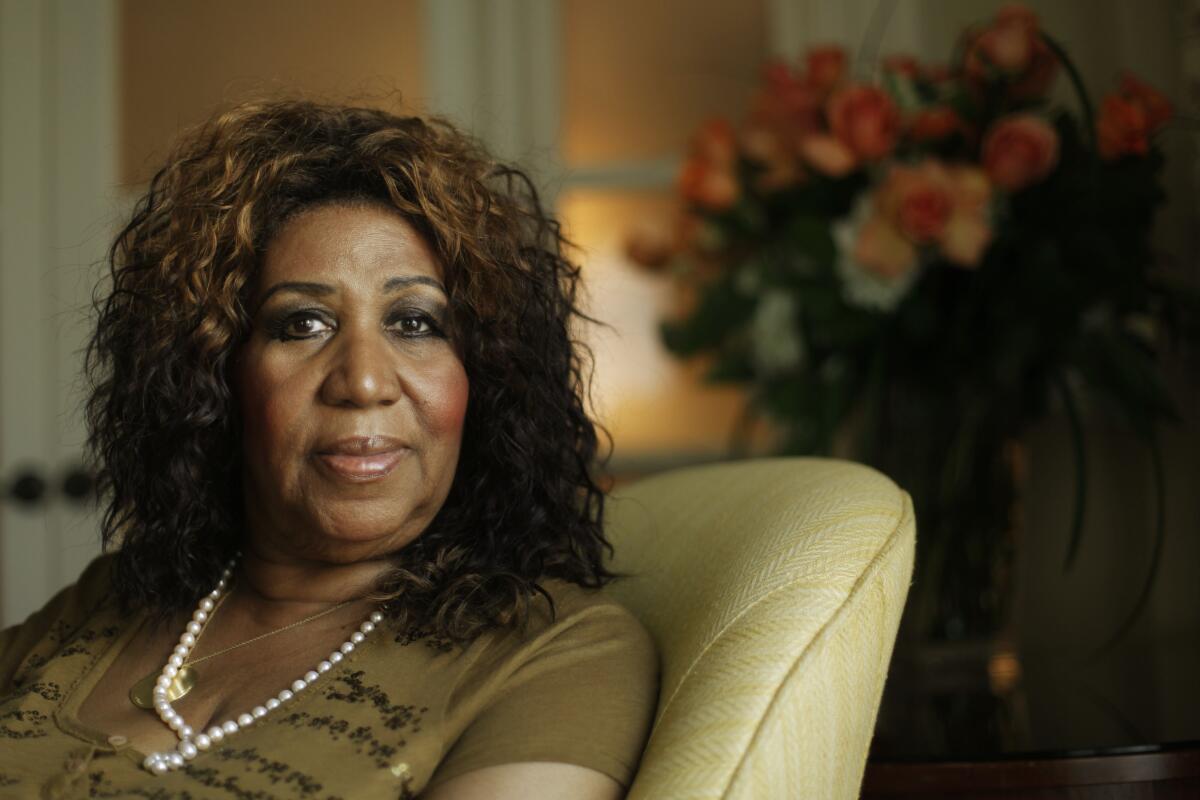Aretha Franklin jury selects a valid will: It’s the one found in the late singer’s couch

- Share via
A Michigan jury decided Tuesday that a handwritten will found sandwiched between couch cushions in Aretha Franklin’s home after her death in 2018 is valid, according to reports.
The soul music legend had left behind two wills, scrawled in notebooks and on pieces of paper, that were found inside her Detroit home after her death from pancreatic cancer at age 76. The wills disagreed on which family members would control her estate, estimated at more than $80 million, prompting turmoil among Franklin’s children. A legal battle amounted to a brief trial at an Oakland County courthouse that started Monday and ended with a jury decision Tuesday.
After deliberating for less than an hour, the jury chose the will that was written in 2014 and found in Franklin’s couch months after her death, according to the Associated Press. It names Franklin’s niece Sabrina Owens and Franklin’s son Kecalf Franklin as co-executors of the estate. The will also states that Kecalf Franklin and his children, Aretha Franklin’s only grandchildren, will get his mother’s main home in Bloomfield Hills, Mich., which was valued at $1.1 million when she died but which is worth much more today.
Aretha Franklin left behind two handwritten wills when she died in 2018. Now, as her sons duel over which is correct, the case heads to trial.
The older will, written in 2010 and found inside a cabinet in Franklin’s home, lists one of her other sons, Theodore White, and the niece, Owens, as co-executors of the estate. It also says Kecalf Franklin and her fourth son, Edward Franklin, “must take business classes and get a certificate or a degree” to benefit from the estate.
The 2014 will, which prevailed in court, does not mention such requirements for Kecalf and Edward.
“I’m very, very happy. I just wanted my mother’s wishes to be adhered to,” Kecalf Franklin told the AP. “We just want to exhale right now. It’s been a long five years for my family, my children.”
Aretha Franklin, the preacher’s daughter who became the “Queen of Soul” and forged the template of the larger-than-life pop diva with her exuberant, gospel-rooted singing, has died.
When the “Respect” singer died five years ago, family members believed she had not left a will to dictate how her estate would be managed. Franklin’s four children expected to share her assets evenly, in line with Michigan law if an individual dies without a will or a spouse.
In 2019, however, Owens scoured Franklin’s home and found the two handwritten wills, which were full of scribbles and passages that were difficult to decipher. While both wills agreed that her sons would share the proceeds of their mother’s estate, such as ongoing earnings from her recordings, they differed on who would serve as executors, pitting her children against one another.
Owens had served as the executor of the estate immediately after the “Chain of Fools” singer’s death. She quit in 2020 as an effort to “calm the rift in my family,” the Detroit Free Press reported.
Since then, Franklin’s estate managers have been paying bills, settling millions in tax debts with the Internal Revenue Service and generating income through music royalties and other intellectual property. The will, however, remained contested among the family.
Jennifer Hudson was hand-picked by the Queen of Soul to star in her bio-pic, and “Respect” marks the culmination of a 15-year long journey.
Leading up to the trial, Kurt Olson, an attorney for White, defended the 2010 will, telling the AP that the document was notarized and signed, while the later version was “merely a draft.”
“If this document were intended to be a will there would have been more care than putting it in a spiral notebook under a couch cushion,” Olson said.
In closing arguments during the trial, lawyers for Kecalf and Edward Franklin said the fact that the 2014 papers were found in couch cushions did not make them less significant, according to the AP.
“You can take your will and leave it on the kitchen counter. It’s still your will,” attorney Charles McKelvie told the jury.
Another lawyer, Craig Smith, pointed to the first line of the 2014 document, which was displayed on four large posters in front of the jury.
“Says right here: ‘This is my will.’ She’s speaking from the grave, folks,” Smith said.
More to Read
The biggest entertainment stories
Get our big stories about Hollywood, film, television, music, arts, culture and more right in your inbox as soon as they publish.
You may occasionally receive promotional content from the Los Angeles Times.











